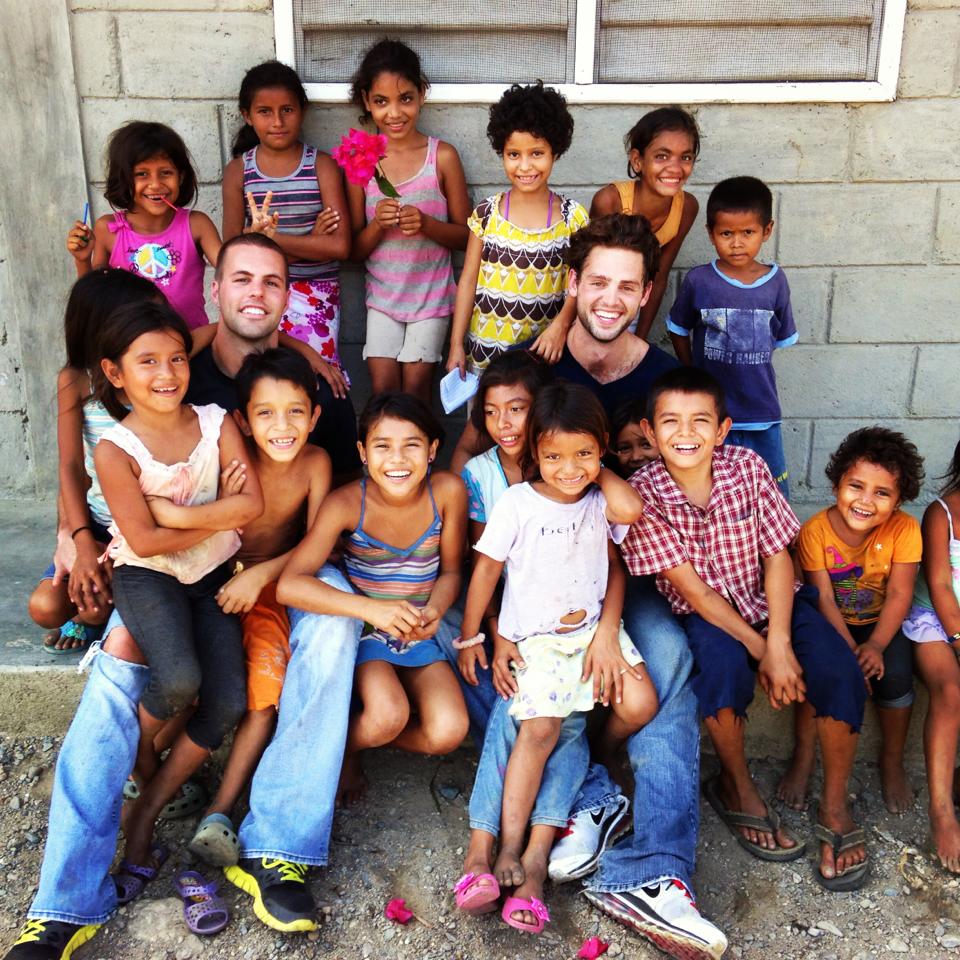
I’m one of the most unlikely people to be sharing my story. The fact that my life has gotten mixed up with good things, and now I get to talk about some of the beautiful things that come from dreaming is truly humbling.
The story I’m able to be part of in Honduras through Humanity and Hope United, and through my small business, Generous Coffee, directly relates to how God spoke to me and others through The Global Leadership Summit.
The way I ended up in Honduras was completely by accident.
When I was in college, my main goal was to be a soccer player. I was the captain of the team by my sophomore year, and then again by my junior year. But I was really focused on achievement and not on understanding who I am and my foundation. While I was achieving, I was also numbing with substances like drugs and alcohol, and eventually that caught up with me.
He could tell that I had a good heart but that my head wasn’t making decisions to match.
I got arrested on campus. The president called me in, because not only was I captain of the soccer team, I was also the liaison between the athletic department and the administration. He could tell that I had a good heart but that my head wasn’t making decisions to match. He said, I think you need to take some time off school and really get to know yourself and find yourself. But really, all I wanted to do was keep achieving and going to school. I said, I’ll go to recovery and therapy, and I’ll get this nailed. But I got a DUI on campus and got kicked out. During that time, I went deeper and deeper into the pain I was in. I ended up following up that first DUI with a second DUI and wrecked my dad’s car.
Coincidentally, this happened to be while he and the rest of my family were in Honduras in 2006. They had invited me to come, but after the soccer dream died, the investment banking dream was born. Nothing about going to Honduras was going to help me make more money. I didn’t want to be a part of that. But after I wrecked my dad’s car, he let me know that I could either come to Honduras with the family, or that he’d stop paying for my education. So, I decided to go to Honduras.
I got to Honduras, and that was when the concept of the birth lottery coalesced in my mind. No one chooses who their mom or dad is. But depending on who those two people are, you can either start off in the 99th percentile, or you can start off on the very bottom. And frankly I had never met a lot of people or had been to a country where there were so many people on the “bottom.”
I got so mad at the injustice.
I remember going to the first village, and part of what was hard for me was that the organization I was working with wanted to give a way a food box that would only last a week. And they only did it through the church, and the church only gave food to Christians. I wasn’t a Christian at the time. I believed there was a higher power, but I didn’t know Jesus. I didn’t have a relationship with God, and I wasn’t looking for one either.
I thought, if there is a God there’s no way he’s saying, these people are good enough to eat and these people are not.
Not being a Christian myself at that point, I thought, if there is a God there’s no way he’s saying, these people are good enough to eat and these people are not. These people are good enough to be recognized as human, and these people are not. These people are good enough to have dignity, and these are not. I got so mad at the injustice of it.
Having really squandered away a ton of opportunity I was given, I pictured myself starting at the bottom.
The first family I met lived in a little lean-to structure that was made waterproof by a tarp, and the tarp was a big trash bag from the airport—it said, “Delta Refuse.” As I remember that first family, I never even dreamed of something so painful. These people don’t have any water or predictable food. They don’t have a permanent structure, and on top of that, they’re literally being labeled as trash. How is it that this two-and-a-half-hour plane ride led to this?
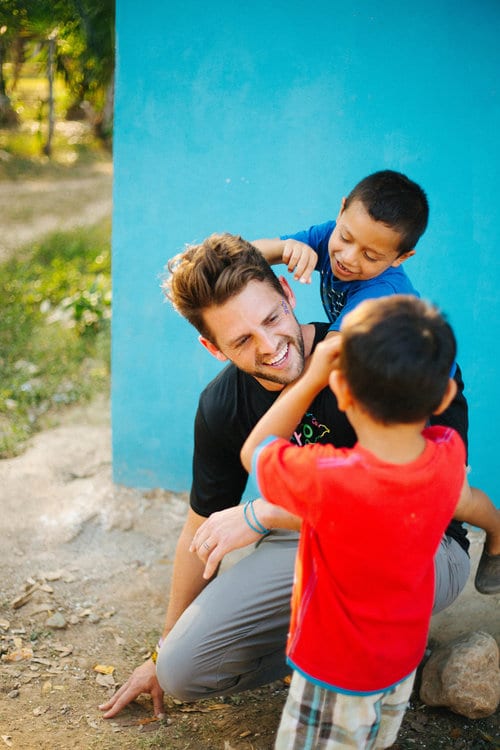 I kept going to isolated village after isolated village. The backdrop is that most people had gone to school up to 6th grade at the maximum. The average earnings are $0 to $5 a day. Pretty much everyone is struggling to survive. And the concept of hope that tomorrow will get better doesn’t exist because of violence, corruption or general injustice. People who were born without opportunities don’t believe opportunities exist for them. But poor is not a destination. It is not who you were created or intended to be. It’s a challenge we can overcome together.
I kept going to isolated village after isolated village. The backdrop is that most people had gone to school up to 6th grade at the maximum. The average earnings are $0 to $5 a day. Pretty much everyone is struggling to survive. And the concept of hope that tomorrow will get better doesn’t exist because of violence, corruption or general injustice. People who were born without opportunities don’t believe opportunities exist for them. But poor is not a destination. It is not who you were created or intended to be. It’s a challenge we can overcome together.
I thought, one day when I’m an old rich man, I will do something about it. Thankfully, it didn’t take that long. The next summer I had about six months between when I graduated and when my job started in investment banking. I went to Honduras to understand more. I had a volunteer job with the government and a couple other non-profits. I just wanted to learn.
I actually got fired from all the jobs I had. Now I see why. When people would say one thing and do another and do things that would take them further from the goal of serving the poor and hungry, instead of closer, it would drive me crazy. So, I would speak up and talk about it perpetuating injustice and get fired. I left that summer feeling like the experience was for nothing. I moved on to the next chapter in life.
Caught between two worlds.
If I can make all my dreams come true, and still not be happy, I better find a way to add value to someone else’s life or there’s no reason to be here.
I got an investment banking job in Philadelphia and my first responsibility was to manage a billion-dollar portfolio, and to trade $100M equity derivatives every week. I was dealing with a lot of money and working with a lot of people making a lot of money. I became torn between these two worlds—the world where I tried my hardest to climb the ladder and the world I felt like I belonged in. After a couple years, I lost a little bit of my soul until I felt like I had nothing left. If I can make all my dreams come true, and still not be happy, I better find a way to add value to someone else’s life or there’s no reason to be here.
That’s when a friend of mine and I decided to start Humanity and Hope United (in addition to our regular day jobs). We really wanted to see people to get from point A to point B, going from feeling like they are not enough to really knowing in their heart of hearts that they are more than enough. That was the goal, and through a lot of failure and learning opportunities, over three years, I hit a rough patch personally. I got sick in 2013 and lost my job in investment banking. I left everything that was a foundation and that had helped me feel strong in my pursuit of a career. I lost all of it.
Rock bottom–where I met God
I ended up moving back home to Indiana and living with my parents. At the point of losing everything I had worked for, I finally turned to God. I met Jesus. It really provided both the language around my values and what I had been dreaming about—number one being loving God and others first, and then focusing on what we can do together after that. God promises that when we do things after his heart—when we care for the poor, fight injustice—there are a lot of beautiful promises that come with that.
I went to The Global Leadership Summit in the US for the first time in 2014, the first year after I became a Christian and right after my first son was born. It felt like God giving me the tools to bring to life what he had given me the dream for—how to lead consistently, how to be a leader other people love to follow, how to follow others, how to truly lead with love and active humility and empathy. And doing it in a way where I can my heart into it, trusting God for the outcome.
The ripple effect of the Summit in Honduras
I went to our Honduran team with Humanity and Hope United and said, I think you’ll really love this. Let’s give it a shot. The first year, there was a group of four of us that went. We noticed that first year was great, but if this is a leadership conference, we should bring all the leaders and not just paid staff.
It felt like God giving me the tools to bring to life what he had given me the dream for…
In every village, there’s a leader designated to lead businesses forward, so we brought each of the leaders from those communities. There were people attending who had never left rural Honduras. I remember them looking around, feeling a little bit out of place. When I asked about what they got out of it they said they felt known, valued and accepted—“I feel like I’m good enough.”
My favorite story is about Jose Luis, who attended the Summit for the first time and got his grander vision to buy land for farming, which today is changing the lives of an entire community, giving them a livelihood they never had before. (Read more about Jose Luis’ story in part two.)
The Summit has been a huge piece of the puzzle.
When you really dive down into leadership, you realize how God-breathed the concept of really leadership is. When local leaders get better, and the local church gets better, everybody gets better. I’ve gotten into this head space where I used to be an investment banking guy, and now I’m a non-profit guy. And after going to the Summit, I realized, I’m a leader that God created, just like everybody else. I’m not going to put myself in a box. With this new vision of who I was, a friend and I were able to also start a for-profit business with a friend that is a lot bigger than we imagined it could be. It brings in publicity for the people we’re serving, and it also brings in a ton more resources too. I never thought about starting a for-profit business before, but the Summit played a big part in that too. It’s called Generous Coffee.
After going to the Summit, I realized, I’m a leader that God created…
The Summit gave me a foundation and structure for my dreams to grow.
You never really know the magic that can happen together until you get in the game. The Summit gave me a language for knowing how to build a foundation of leadership, being consistent, being present with people, identifying what people are good at and encouraging to build things they don’t even know they’re good at yet.
It showed me people that lived things that were similar and gave me the structure. And with the structure, I felt like my dreams could grow. When I’m able to express my dreams, God has given to me, not only do they involve other people, they involve making other people stronger on purpose. And when that’s the goal, it’s magnetic. Everyone wants to dream bigger than themselves, which leads people to help others do the same. I had never been able to execute or articulate these ideas before the Summit.
Yes, the Summit is good for your leadership, but what I wanted to be a part of was building a movement and building a body and that’s bigger than me. I couldn’t reach that bigness before I went to the Summit. If you want your dream to grow bigger than you, that’s why you need to go to the Summit.

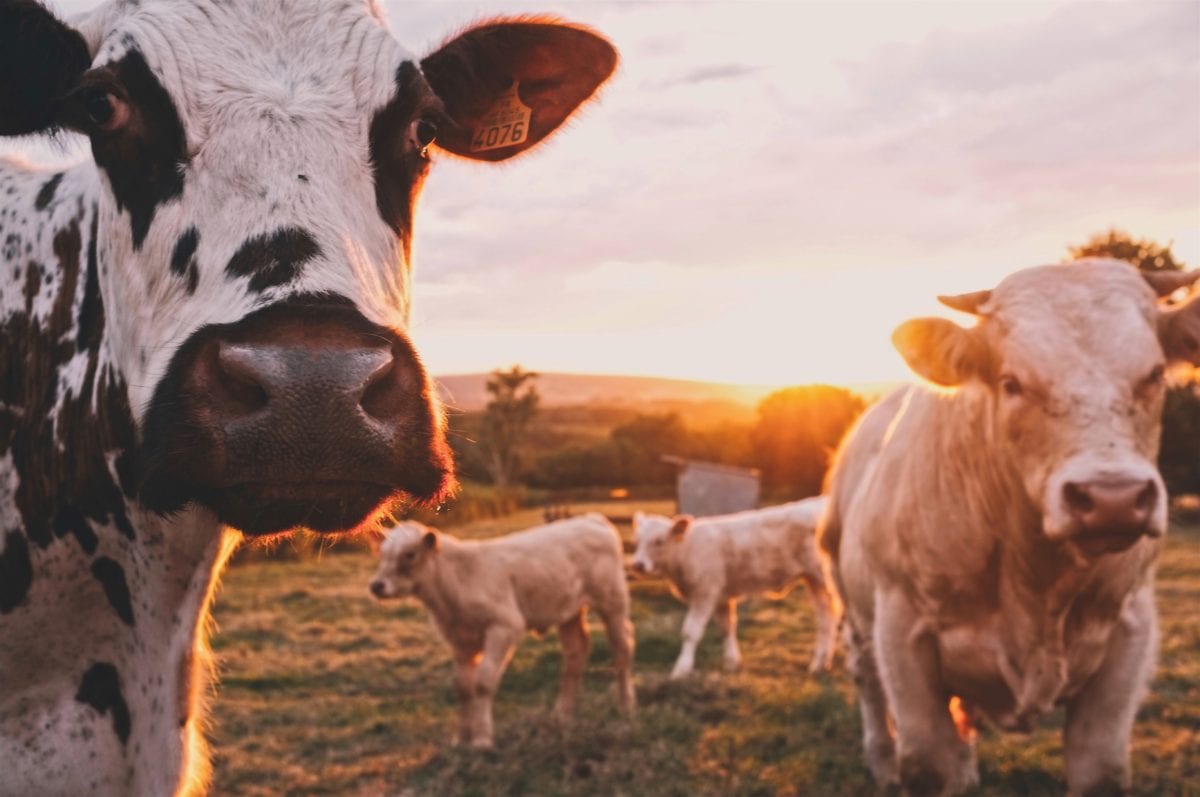
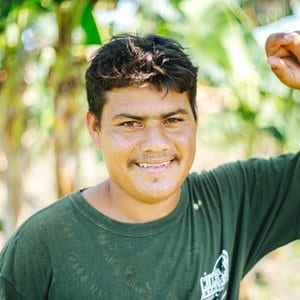 My favorite story is about Jose Luis, who attended the Summit for the first time and got his grander vision to buy land for farming, which today is changing the lives of an entire community, giving them a livelihood they never had before.
My favorite story is about Jose Luis, who attended the Summit for the first time and got his grander vision to buy land for farming, which today is changing the lives of an entire community, giving them a livelihood they never had before.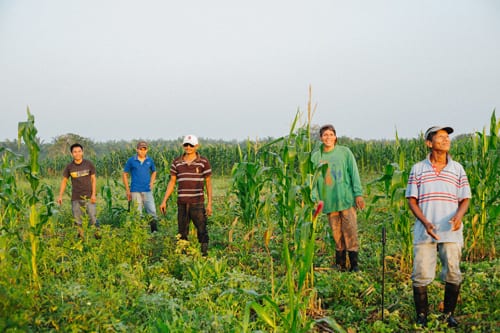 Jose Luis and his team were able to buy the land. It was the very last piece of land in the area they could buy, supporting 20 families in the community who now work on that farm. Now they’re able to supply other local businesses, and they have economic freedom to some degree, but they also know that this land isn’t going to be taken from them. They have a way to move forward to bring education, healthcare or even a lollipop for their kids.
Jose Luis and his team were able to buy the land. It was the very last piece of land in the area they could buy, supporting 20 families in the community who now work on that farm. Now they’re able to supply other local businesses, and they have economic freedom to some degree, but they also know that this land isn’t going to be taken from them. They have a way to move forward to bring education, healthcare or even a lollipop for their kids. They have a way to provide for themselves, and at the same time, they have a way to help other communities in need. And now the nearby community they’ve started to serve has been able to build their own school. Before then, only 10 percent of the children were going to school, and now 90+ percent are attending school. It’s part of a change of leading for more life and hope.
They have a way to provide for themselves, and at the same time, they have a way to help other communities in need. And now the nearby community they’ve started to serve has been able to build their own school. Before then, only 10 percent of the children were going to school, and now 90+ percent are attending school. It’s part of a change of leading for more life and hope.
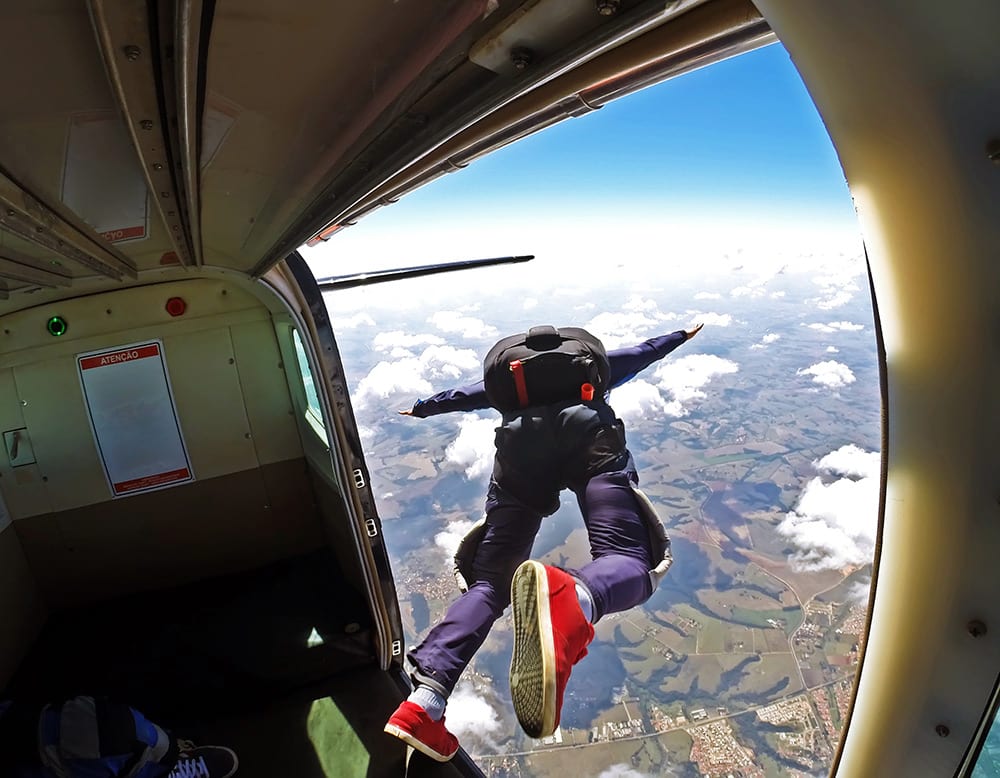
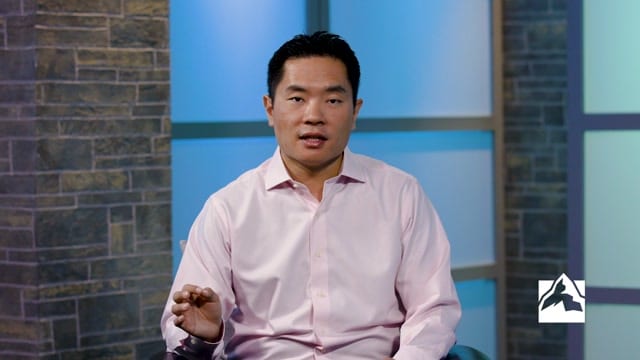


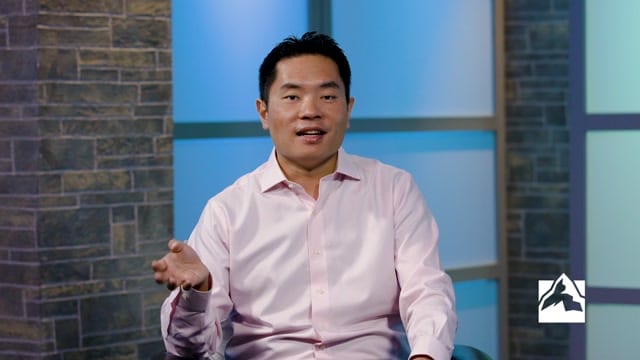
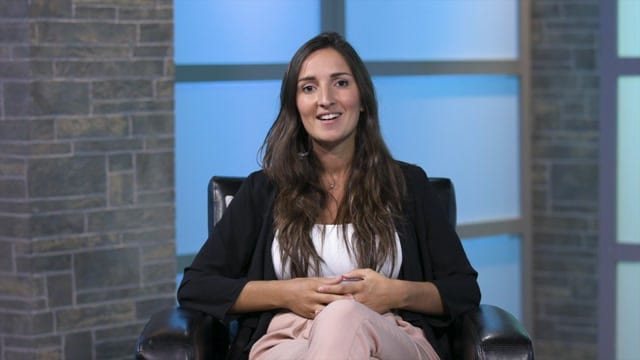
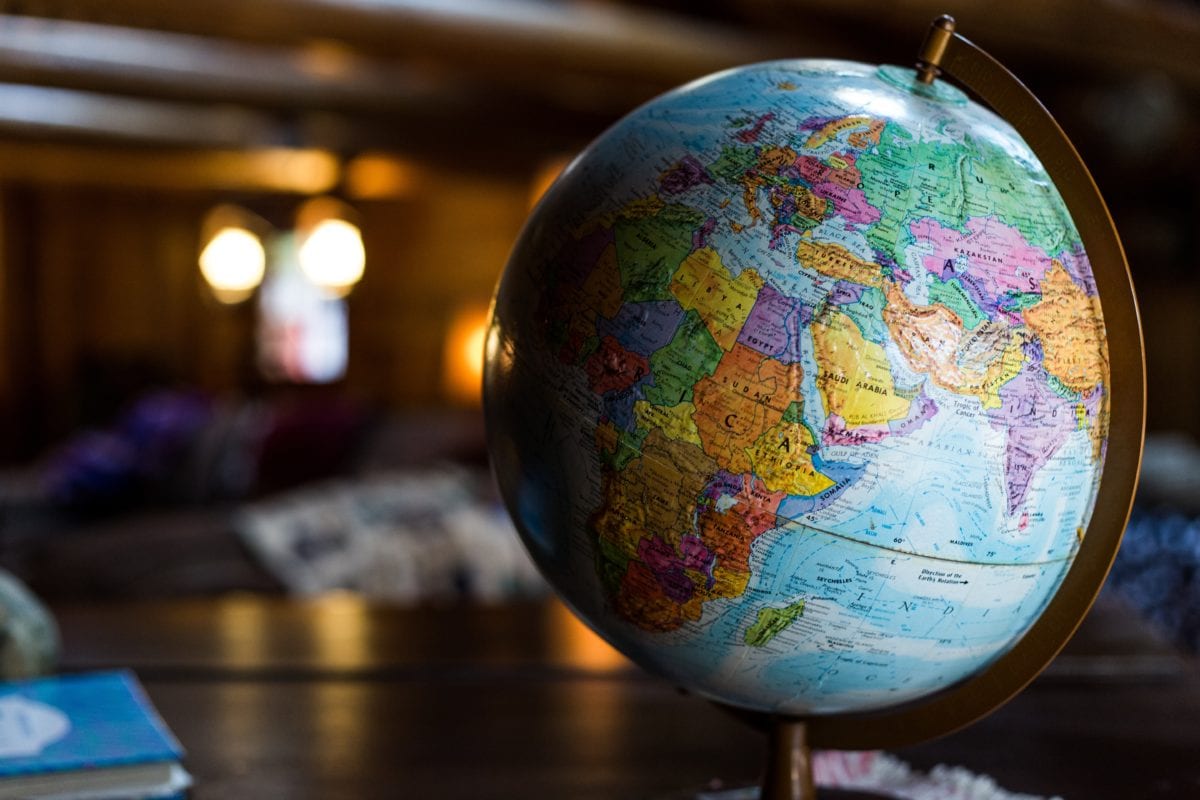
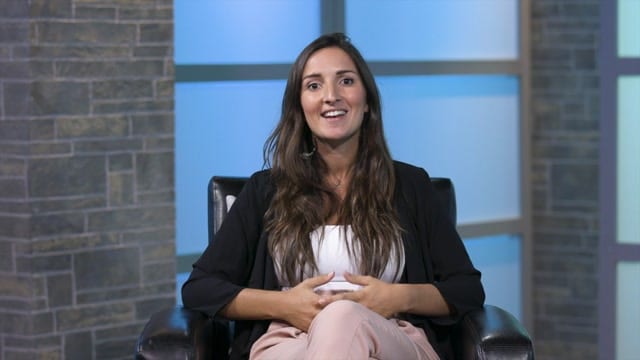

Recent Comments